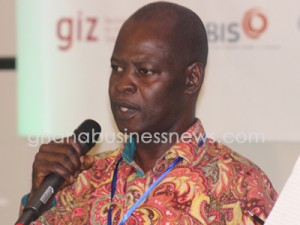Ghana needs commodities fund – Dr Manteaw

Dr Steve Manteaw, Co-Chair of the multi-stakeholder Committee of the Ghana Extractive Industry Industries Transparency Initiative (GHEITI), has highlighted the need for a commodities Fund, to manage shocks to the economy from commodity price fluctuations.
He said the fund should be set up along the lines of what had been done in the Oil and Gas sector to better manage the effects of commodity price changes in the world markets on Ghana’s economy.
He made the suggestion at a two-day analysis workshop on the 2014 GHETI Reports on Mining and Oil and Gas sectors for journalists organised by the Institute of Financial and Economic Journalists in partnership with the GIZ.
Dr Manteaw, who is also the Campaign Coordinator of the Integrated Social Development Centre, said a commodities fund would help to mitigate effects of the falling prices.
The World Bank in January lowered its 2016 forecast for crude oil prices to $37 per barrel in its Commodity Markets Outlook report, from $51 per barrel in its October projections.
The Bank also forecasted that beyond oil markets, all main commodity price indices are expected to fall in 2016 due to persistently large supplies, and in the case of industrial commodities, slowing demand in emerging market economies.
In all, prices for 37 of the 46 commodities the World Bank monitors were revised lower for 2016.
A press release on the revision, available on its website, noted that emerging market economies had been the main sources of commodity demand growth since 2000, as a result, weakening growth prospects in these economies were weighing on commodity prices.
Ayhan Kose, Director of the World Bank’s Development Prospects Group is quoted as saying: “Low commodity prices are a double-edged sword, where consumers in importing countries stand to benefit while producers in net exporting countries suffer. It takes time for the benefits of lower commodity prices to be transformed into stronger economic growth among importers, but commodity exporters are feeling the pain right away, ”he said
Ghana is a net commodities exporter, exporting Gold, Bauxite, Manganese, and recently crude oil, among others, with its share of proceeds from these commodities earning the country foreign exchange.
The fluctuating prices of commodities therefore present challenges to the nation, which require mechanisms to manage the effects from the falling prices, as has been done in the Oil and Gas sector with the Petroleum Holding Funds and the Ghana Petroleum Funds established by the Petroleum Revenue Management Act (2011) (Act 815).
The workshop, facilitated by Mr Kwaku Boamponsem of Boas and Associates, who prepared the 2014 GHEITI reconciliation reports, took participants through the two reports, with the aim of helping the journalists to understand the issues raised in the reports and also to help them develop story lines based on the findings and recommendations of the reports.
Mr Allan Lassey, Senior Advisor-Extractive Resource Governance of the GIZ encouraged participants to go beyond writing event-based stories and to follow-up on the issues raised in the reports especially the social and human rights aspects of the extractive sector.
Source: GNA
